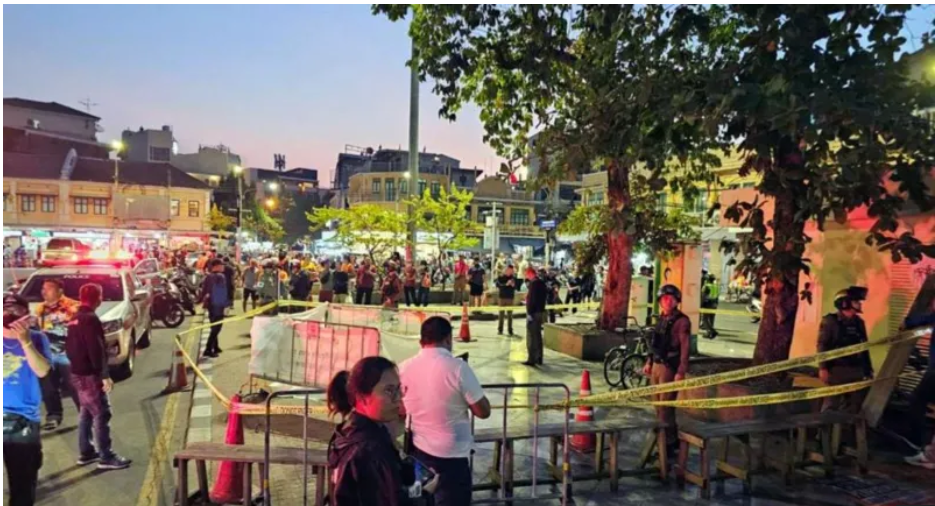A politician was shot dead in Bangkok.
The assassination had all the hallmarks of a calculated, professional hit.
Near a prominent temple in Bangkok’s historic royal district, a man is captured on security camera footage parking his motorbike, removing his helmet to reveal his face, and walking calmly across the street.
A few minutes later, gunshots ring out, and another man collapses to the ground.
The assassin quickly returns to his motorbike, seemingly discarding something along the way, before driving off.
The victim was Lim Kimya, a 73-year-old former member of the Cambodian National Rescue Party (CNRP), which was banned in 2017. He had been shot twice in the chest, according to Thai police. Lim had just arrived in Bangkok with his wife on a bus from Cambodia.
A police officer attempted to revive him, but he was declared dead at the scene.
“He was courageous, with an independent mind,” said Monovithya Kem, daughter of CNRP leader Kem Sokha, in an interview with the BBC.
“No one but the Cambodian state would have wanted to kill him.”
Lim Kimya held both Cambodian and French citizenship but chose to remain in Cambodia even after his party was dissolved. The CNRP, formed by merging two earlier opposition groups, came close to defeating Prime Minister Hun Sen’s party in the 2013 election. Hun Sen, a longtime ruler of Cambodia, accused the CNRP of treason, leading to its dissolution and a campaign of legal and political persecution against its members. In 2023, Kem Sokha was sentenced to 27 years in prison after spending six years under house arrest.
High-level political assassinations, though not unknown, are relatively rare in Cambodia; in 2016 a popular critic of Hun Sen, Kem Ley, was gunned down in Phnom Penh, and 2012 environmental activist Chut Wutty was also murdered.
From the security camera video, the Thai police have already identified Lim Kimya’s killer as an ex-Thai navy officer, now working as a motorbike taxi driver. Finding him should not be difficult.
Whether the killing is fully investigated, though, is another matter.
In recent years dozens of activists fleeing repression in Cambodia, Vietnam, Laos, and Thailand have been sent back after seeking sanctuary, or in some cases have been killed or disappeared. Human rights groups believe there is an unwritten agreement between the four neighboring countries to allow each other’s security forces to pursue dissidents over the border.
Last November Thailand sent six Cambodian dissidents, together with a young child, back to Cambodia, where they were immediately jailed. All were recognized by the United Nations as refugees. Earlier in the year Thailand also sent a Vietnamese Montagnard activist back to Vietnam.
In the past Thai anti-monarchy activists have been abducted and disappeared in Laos, it is widely presumed by Thai security forces operating outside their own borders. In 2020 a young Thai activist who had fled to Cambodia, Wanchalerm Satsaksit, was abducted and disappeared, again it is assumed by Thai operatives.
The Cambodian authorities did little to investigate, and announced last year that they had closed the case. It is possible the same will now happen in the case of Lim Kimya.
“Thailand has presided over a de facto ‘swap arrangement’,” says Phil Robertson, director of the Asia Human Rights and Labour Advocates in Thailand.
“Dissidents and refugees are traded for political and economic favours with its neighbouring countries. The growing practice of transnational repression in the Mekong sub-region needs to be stopped in its tracks.”
When the US and UK-educated Hun Manet succeeded his father as Cambodia’s prime minister there was some speculation over whether he might rule with a lighter hand. But opposition figures are still being prosecuted and jailed, and what little space was left for political dissent has been almost completely closed.
From his semi-retirement the figure of Hun Sen still hovers over his son’s administration; he is now calling for a new law to brand anyone trying to replace him as a terrorist.
Thailand, which lobbied hard for, and won, a seat on the UN Human Rights Council this year, will now be under pressure to show that it can bring those behind such a brazen assassination on the streets of its capital to justice.



